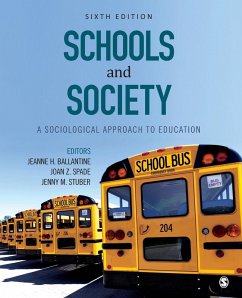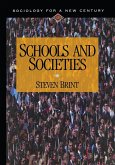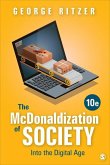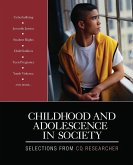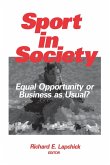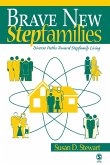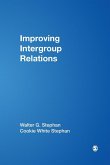Jeanne H. Ballantine, Joan Z. Spade, Jenny M. Stuber
Schools and Society
A Sociological Approach to Education
Jeanne H. Ballantine, Joan Z. Spade, Jenny M. Stuber
Schools and Society
A Sociological Approach to Education
- Broschiertes Buch
- Merkliste
- Auf die Merkliste
- Bewerten Bewerten
- Teilen
- Produkt teilen
- Produkterinnerung
- Produkterinnerung
This comprehensive anthology features classical readings on the Sociology of Education, as well as current, original essays by notable contemporary scholars. Assigned as a main text or a supplement, this fully updated Sixth Edition uses the open systems approach to provide readers with a framework for understanding and analyzing the book's range of topics. Jeanne H. Ballantine, Joan Z. Spade, and new co-editor Jenny M. Stuber, all experienced instructors in this subject, have chosen articles that are highly readable, and that represent the field's major theoretical perspectives, methods, and…mehr
Andere Kunden interessierten sich auch für
![Schools and Societies Schools and Societies]() Steven BrintSchools and Societies139,99 €
Steven BrintSchools and Societies139,99 €![Religious Pluralism and Civil Society Religious Pluralism and Civil Society]() Wade Clark RoofReligious Pluralism and Civil Society74,99 €
Wade Clark RoofReligious Pluralism and Civil Society74,99 €![The McDonaldization of Society The McDonaldization of Society]() George RitzerThe McDonaldization of Society93,99 €
George RitzerThe McDonaldization of Society93,99 €![Childhood and Adolescence in Society Childhood and Adolescence in Society]() Cq ResearcherChildhood and Adolescence in Society75,99 €
Cq ResearcherChildhood and Adolescence in Society75,99 €![Sport in Society Sport in Society]() Richard E. LapchickSport in Society139,99 €
Richard E. LapchickSport in Society139,99 €![Brave New Stepfamilies Brave New Stepfamilies]() Susan D. StewartBrave New Stepfamilies103,99 €
Susan D. StewartBrave New Stepfamilies103,99 €![Improving Intergroup Relations Improving Intergroup Relations]() Walter G StephanImproving Intergroup Relations191,99 €
Walter G StephanImproving Intergroup Relations191,99 €-
-
-
This comprehensive anthology features classical readings on the Sociology of Education, as well as current, original essays by notable contemporary scholars. Assigned as a main text or a supplement, this fully updated Sixth Edition uses the open systems approach to provide readers with a framework for understanding and analyzing the book's range of topics. Jeanne H. Ballantine, Joan Z. Spade, and new co-editor Jenny M. Stuber, all experienced instructors in this subject, have chosen articles that are highly readable, and that represent the field's major theoretical perspectives, methods, and issues. The Sixth Edition includes twenty new selections and five revisions of original readings and features new perspectives on some of the most contested issues in the field today, such as school funding, gender issues in schools, parent and neighborhood influences on learning, growing inequality in schools, and charter schools.
Hinweis: Dieser Artikel kann nur an eine deutsche Lieferadresse ausgeliefert werden.
Hinweis: Dieser Artikel kann nur an eine deutsche Lieferadresse ausgeliefert werden.
Produktdetails
- Produktdetails
- Verlag: Sage Publications, Inc
- 6. Auflage
- Seitenzahl: 530
- Erscheinungstermin: 20. November 2017
- Englisch
- Abmessung: 235mm x 191mm x 28mm
- Gewicht: 978g
- ISBN-13: 9781506346977
- ISBN-10: 1506346979
- Artikelnr.: 45188968
- Herstellerkennzeichnung
- Libri GmbH
- Europaallee 1
- 36244 Bad Hersfeld
- gpsr@libri.de
- Verlag: Sage Publications, Inc
- 6. Auflage
- Seitenzahl: 530
- Erscheinungstermin: 20. November 2017
- Englisch
- Abmessung: 235mm x 191mm x 28mm
- Gewicht: 978g
- ISBN-13: 9781506346977
- ISBN-10: 1506346979
- Artikelnr.: 45188968
- Herstellerkennzeichnung
- Libri GmbH
- Europaallee 1
- 36244 Bad Hersfeld
- gpsr@libri.de
Jeanne H. Ballantine is Professor of Sociology at Wright State University. She has been teaching sociology for more than 30 years with a mission to introduce the uninitiated to the field and to help students see the usefulness and value in sociology. Jeanne has been active in the teaching movement, shaping curriculum, writing and presenting research on teaching, and offering workshops and consulting in regional, national, and international forums. She is a Fulbright Senior Scholar and serves as a Departmental Resources Group consultant and evaluator. In 1986, the American Sociological Association's Section on Undergraduate Education (now called the Section on Teaching and Learning in Sociology) recognized her with the Hans O. Mauksch Award for Distinguished Contributions to Teaching of Sociology. In 2004, she was honored by the American Sociological Association with its Distinguished Contributions to Teaching Award. In 2010, the North Central Sociological Association awarded her the J. Milton Yinger Award for Distinguished Career in Sociology. Jeanne is also co-author of two introductory sociology texts with SAGE, Our Social World and Our Social World Condensed. Joan Z. Spade is Professor Emeriti of sociology at The College at Brockport, State University of New York. She received her PhD from University at Buffalo, State University of New York, her MA from the University of Rochester, and her BA from State University of New York at Geneseo. In addition to courses on gender, Joan taught courses on education, family, research methods, and statistics. She published articles on rape culture in college fraternities and on work and family, including women's and men's orientations toward work. She has also coedited two books on education and published articles on education, including research on tracking, and gender and education. Joan is active in Sociologists for Women in Society, Eastern Sociological Society, and the American Sociological Association. She is also co-author of a gender anthology for SAGE, The Kaleidoscope of Gender. Jenny M. Stuber is Associate Professor of Sociology at the University of North Florida. She received her a PhD in Sociology from Indiana University. Jenny's research focuses on the cultural aspects of social class inequality and how people understand, enact, and use social class in their everyday lives. Her book, Inside the College Gates: How Class and Culture Matter in Higher Education (Lexington Books, 2011), investigates the how social class and first-generation status shape how students navigate the college environment, focusing specifically on their social interactions and extra-curricular involvement. Her research has also appeared in Sociological Forum, The Journal of Contemporary Sociology, The International Journal of Qualitative Studies in Education, and Teaching in Higher Education. Jenny is an Editorial Board member for two journals, Teaching Sociology and Sociology of Education, and a Council member for the Sociology of Education section in the American Sociological Association.
Chapter 1: What Is Sociology of Education? Theoretical Perspectives Reading 1. Sociology of Education: A Unique Perspective for Understanding Schools - Jeanne H. Ballantine and Flloyd M. Hammack Reading 2. Getting Started: Understanding Education Through Sociological Theory - Jeanne H. Ballantine and Joan Reading 3. Moral Education - Emily Durkheim Reading 4. Conflict Theory of Educational Stratification - Randall Collins Reading 5. Social Reproduction - David Swartz Reading 6. On Understanding the Process of Schooling: The Contributions of Labeling Theory - Ray C. Rist Chapter 2: Studying Schools: Research Methods in Education Reading 7. Chilly Classrooms for Female Undergraduate Students: A Question of Method? - Elizabeth J. Allan and Mary Madden Reading 8. Small Class Size and Its Effects - Bruce J. Biddle and David C. Berliner Reading 9. How to Avoid Statistical Traps - Gerald W. Bracey Chapter 3: Schooling in a Social Context: Educational Environments Reading 10. The Structure of Educational Organizations - John. W. Meyer and Brian Rowan Reading 11. A Broader and Bolder Approach Uses Education to Break the Cycle of Poverty - Pedro A. Noguera Reading 12. Good Schools, Rich Schools; Bad Schools, Poor Schools: Why Americäs Public Schools are so Unequal - Alana Semuels Reading 13. Coached for the Classroom: Parents
Cultural Transmission and Children
s Reproduction of Educational Inequalities - Jessica McCrory Calarco Chapter 4: Schools as Organizations: Formal and Informal Education Reading 14. How Schools Work - Rebecca Barra and Robert Dreeben Reading 15. Learning the Student Role: Kindergarten as Academic Boot Camp - Harry L. Gracey Reading 16. Becoming a Gendered Body: Practices of Preschools - Karin A. Martin Reading 17. "Why Can
t We Learn About This?": Sexual Minority Students Navigate the Official and Hidden Curricular Spaces of High School - Ingrid E. Castro and Mark Conor Sujak Reading 18. Academic Learning + Socioemotional Learning=National Priority - Roger P. Weissberg and Jason Cascarino Chapter 5: Roles and Responsibilities: Administrators, Teachers, and Students Reading 19. School Boards: Why American Education Needs Them - Anne L. Bryant Reading 20. School Principal: Complications and Complexities - Dan C. Lortie Reading 21. The Status of Teaching as a Profession - Richard M. Ingersoll and Gregory Collins Reading 22. Perils and Promises: Middle-Class Parental Involvement in Urban Schools - Maria Bloomfield Cucchiara and Erin McNamara Horvat Reading 23. Make Students Part of the Solution, Not the Problem - Trevor Gardner Chapter 6: What We Teach in Schools: Knowledge for What and for Whom? Reading 24. Monuments Between Covers: The Politics of Textbooks - David Tyack Reading 25. The Changing Face of War in Textbooks: Depictions of World War II and Vietnam, 1970-2009 - Richard Lachmann and Lacy Mitchell Reading 26. Facts or Critical Thinking Skills? What NAEP Results Say - Harold Wenglinsky Chapter 7: Who Gets Ahead? Race, Class, and Gender in Education Reading 27. Growing Income Inequality Threatens American Education - Greg J. Duncan and Richard J. Murnane Reading 28. The Rules of the Game and the Uncertain Transmission of Advantage: Middle-class Parents
Search for an Urban Kindergarten - Annetee Lareau, Shani Adia Evans, and April Yee Reading 29. The Geography of Inequality: Why Separate Means Unequal in American Public Schools - John R. Logan, Elisabeta Mica, and Sinem Adar Reading 30. Explaining Racial Variations in Education - Caroline Hodges Persell Reading 31. "Rednecks," "Rutters," and "Rithmetic": Social Class, Masculinity, and Schooling in a Rural Context - Edward W. Morris Reading 32. Gender and Education - Roslyn Arlin Michelson Chapter 8: Education and Opportunity: Attempts at Equality and Equity in Education Reading 33. Lessons Forgotten - Gary Orfield Reading 34. Only Here for a Day: Social Integration of Minority Students at a Majority White High School - Megan M. Holland Reading 35. The Challenge of Diverse Public Schools - Toby L. Parcel, Joshua A. Hedrix, and Andrew J. Taylor Reading 36. Charter Schools and the Risk of Increased Segregation - Iris C. Roterg Reading 37. High Stakes Testing Hasn
t Brought Education Gains - Judith Browne Dianis, John H. Jackson, and Pedro Noguera Reading 38. Organizing for Success: From Inequality to Quality - Linda Darling-Hammond Chapter 9: Higher Education Reading 39. The Unintended Decentering of Teaching and Learning - Gaye Tuchman Reading 40. Beyond the One-Size-Fits All College Degree - James Rosenbaum, Kenna Cepa, and Janet Rosenbaum Reading 41. The Not-So-Pink Ivory Tower - Ann Mullen Reading 42. At the Activities Fair: How Class and Culture Matter for Becoming Involved in College - Jenny Stuber Reading 43. Friends with Academic Benefits - Janice McCabe Chapter 10: Globalization and Education: Comparing Global Systems Reading 44. A Global Compact on Learning: Taking Action on Education in Developing Countries - Brookings Institution Reading 45. Inexcusable Absence: Who Are the Out-of-School Girls - and What Can Be Done to Get Them in School? - Maureen A. Lewis and Marlaine E. Lockheed Reading 46. Globalization and the Growth of International Educational Testing and Assessment - David H. Kamens and Connie L. McNeely Reading 47. Too Many Children Left Behind: The U.S. Achievement Gap in Comparative Perspective - Bruce Bradbury, Miles Corak, Jane Waldfogel, and Elizabeth Washbrook Chapter 11: Can Schools Change? Educational Reform and Change Reading 48. Deschooling Society - Ivan Illich Reading 49. How Schools Really Matter - Douglass B. Downey and Benjamin G. Gibbs Reading 50. Can Schooling Contribute to a More Just Society? - Michael W. Apple Reading 51. The Paradox of Success at a No-Excuses School - Joanne W. Golann
Cultural Transmission and Children
s Reproduction of Educational Inequalities - Jessica McCrory Calarco Chapter 4: Schools as Organizations: Formal and Informal Education Reading 14. How Schools Work - Rebecca Barra and Robert Dreeben Reading 15. Learning the Student Role: Kindergarten as Academic Boot Camp - Harry L. Gracey Reading 16. Becoming a Gendered Body: Practices of Preschools - Karin A. Martin Reading 17. "Why Can
t We Learn About This?": Sexual Minority Students Navigate the Official and Hidden Curricular Spaces of High School - Ingrid E. Castro and Mark Conor Sujak Reading 18. Academic Learning + Socioemotional Learning=National Priority - Roger P. Weissberg and Jason Cascarino Chapter 5: Roles and Responsibilities: Administrators, Teachers, and Students Reading 19. School Boards: Why American Education Needs Them - Anne L. Bryant Reading 20. School Principal: Complications and Complexities - Dan C. Lortie Reading 21. The Status of Teaching as a Profession - Richard M. Ingersoll and Gregory Collins Reading 22. Perils and Promises: Middle-Class Parental Involvement in Urban Schools - Maria Bloomfield Cucchiara and Erin McNamara Horvat Reading 23. Make Students Part of the Solution, Not the Problem - Trevor Gardner Chapter 6: What We Teach in Schools: Knowledge for What and for Whom? Reading 24. Monuments Between Covers: The Politics of Textbooks - David Tyack Reading 25. The Changing Face of War in Textbooks: Depictions of World War II and Vietnam, 1970-2009 - Richard Lachmann and Lacy Mitchell Reading 26. Facts or Critical Thinking Skills? What NAEP Results Say - Harold Wenglinsky Chapter 7: Who Gets Ahead? Race, Class, and Gender in Education Reading 27. Growing Income Inequality Threatens American Education - Greg J. Duncan and Richard J. Murnane Reading 28. The Rules of the Game and the Uncertain Transmission of Advantage: Middle-class Parents
Search for an Urban Kindergarten - Annetee Lareau, Shani Adia Evans, and April Yee Reading 29. The Geography of Inequality: Why Separate Means Unequal in American Public Schools - John R. Logan, Elisabeta Mica, and Sinem Adar Reading 30. Explaining Racial Variations in Education - Caroline Hodges Persell Reading 31. "Rednecks," "Rutters," and "Rithmetic": Social Class, Masculinity, and Schooling in a Rural Context - Edward W. Morris Reading 32. Gender and Education - Roslyn Arlin Michelson Chapter 8: Education and Opportunity: Attempts at Equality and Equity in Education Reading 33. Lessons Forgotten - Gary Orfield Reading 34. Only Here for a Day: Social Integration of Minority Students at a Majority White High School - Megan M. Holland Reading 35. The Challenge of Diverse Public Schools - Toby L. Parcel, Joshua A. Hedrix, and Andrew J. Taylor Reading 36. Charter Schools and the Risk of Increased Segregation - Iris C. Roterg Reading 37. High Stakes Testing Hasn
t Brought Education Gains - Judith Browne Dianis, John H. Jackson, and Pedro Noguera Reading 38. Organizing for Success: From Inequality to Quality - Linda Darling-Hammond Chapter 9: Higher Education Reading 39. The Unintended Decentering of Teaching and Learning - Gaye Tuchman Reading 40. Beyond the One-Size-Fits All College Degree - James Rosenbaum, Kenna Cepa, and Janet Rosenbaum Reading 41. The Not-So-Pink Ivory Tower - Ann Mullen Reading 42. At the Activities Fair: How Class and Culture Matter for Becoming Involved in College - Jenny Stuber Reading 43. Friends with Academic Benefits - Janice McCabe Chapter 10: Globalization and Education: Comparing Global Systems Reading 44. A Global Compact on Learning: Taking Action on Education in Developing Countries - Brookings Institution Reading 45. Inexcusable Absence: Who Are the Out-of-School Girls - and What Can Be Done to Get Them in School? - Maureen A. Lewis and Marlaine E. Lockheed Reading 46. Globalization and the Growth of International Educational Testing and Assessment - David H. Kamens and Connie L. McNeely Reading 47. Too Many Children Left Behind: The U.S. Achievement Gap in Comparative Perspective - Bruce Bradbury, Miles Corak, Jane Waldfogel, and Elizabeth Washbrook Chapter 11: Can Schools Change? Educational Reform and Change Reading 48. Deschooling Society - Ivan Illich Reading 49. How Schools Really Matter - Douglass B. Downey and Benjamin G. Gibbs Reading 50. Can Schooling Contribute to a More Just Society? - Michael W. Apple Reading 51. The Paradox of Success at a No-Excuses School - Joanne W. Golann
Chapter 1: What Is Sociology of Education? Theoretical Perspectives Reading 1. Sociology of Education: A Unique Perspective for Understanding Schools - Jeanne H. Ballantine and Flloyd M. Hammack Reading 2. Getting Started: Understanding Education Through Sociological Theory - Jeanne H. Ballantine and Joan Reading 3. Moral Education - Emily Durkheim Reading 4. Conflict Theory of Educational Stratification - Randall Collins Reading 5. Social Reproduction - David Swartz Reading 6. On Understanding the Process of Schooling: The Contributions of Labeling Theory - Ray C. Rist Chapter 2: Studying Schools: Research Methods in Education Reading 7. Chilly Classrooms for Female Undergraduate Students: A Question of Method? - Elizabeth J. Allan and Mary Madden Reading 8. Small Class Size and Its Effects - Bruce J. Biddle and David C. Berliner Reading 9. How to Avoid Statistical Traps - Gerald W. Bracey Chapter 3: Schooling in a Social Context: Educational Environments Reading 10. The Structure of Educational Organizations - John. W. Meyer and Brian Rowan Reading 11. A Broader and Bolder Approach Uses Education to Break the Cycle of Poverty - Pedro A. Noguera Reading 12. Good Schools, Rich Schools; Bad Schools, Poor Schools: Why Americäs Public Schools are so Unequal - Alana Semuels Reading 13. Coached for the Classroom: Parents
Cultural Transmission and Children
s Reproduction of Educational Inequalities - Jessica McCrory Calarco Chapter 4: Schools as Organizations: Formal and Informal Education Reading 14. How Schools Work - Rebecca Barra and Robert Dreeben Reading 15. Learning the Student Role: Kindergarten as Academic Boot Camp - Harry L. Gracey Reading 16. Becoming a Gendered Body: Practices of Preschools - Karin A. Martin Reading 17. "Why Can
t We Learn About This?": Sexual Minority Students Navigate the Official and Hidden Curricular Spaces of High School - Ingrid E. Castro and Mark Conor Sujak Reading 18. Academic Learning + Socioemotional Learning=National Priority - Roger P. Weissberg and Jason Cascarino Chapter 5: Roles and Responsibilities: Administrators, Teachers, and Students Reading 19. School Boards: Why American Education Needs Them - Anne L. Bryant Reading 20. School Principal: Complications and Complexities - Dan C. Lortie Reading 21. The Status of Teaching as a Profession - Richard M. Ingersoll and Gregory Collins Reading 22. Perils and Promises: Middle-Class Parental Involvement in Urban Schools - Maria Bloomfield Cucchiara and Erin McNamara Horvat Reading 23. Make Students Part of the Solution, Not the Problem - Trevor Gardner Chapter 6: What We Teach in Schools: Knowledge for What and for Whom? Reading 24. Monuments Between Covers: The Politics of Textbooks - David Tyack Reading 25. The Changing Face of War in Textbooks: Depictions of World War II and Vietnam, 1970-2009 - Richard Lachmann and Lacy Mitchell Reading 26. Facts or Critical Thinking Skills? What NAEP Results Say - Harold Wenglinsky Chapter 7: Who Gets Ahead? Race, Class, and Gender in Education Reading 27. Growing Income Inequality Threatens American Education - Greg J. Duncan and Richard J. Murnane Reading 28. The Rules of the Game and the Uncertain Transmission of Advantage: Middle-class Parents
Search for an Urban Kindergarten - Annetee Lareau, Shani Adia Evans, and April Yee Reading 29. The Geography of Inequality: Why Separate Means Unequal in American Public Schools - John R. Logan, Elisabeta Mica, and Sinem Adar Reading 30. Explaining Racial Variations in Education - Caroline Hodges Persell Reading 31. "Rednecks," "Rutters," and "Rithmetic": Social Class, Masculinity, and Schooling in a Rural Context - Edward W. Morris Reading 32. Gender and Education - Roslyn Arlin Michelson Chapter 8: Education and Opportunity: Attempts at Equality and Equity in Education Reading 33. Lessons Forgotten - Gary Orfield Reading 34. Only Here for a Day: Social Integration of Minority Students at a Majority White High School - Megan M. Holland Reading 35. The Challenge of Diverse Public Schools - Toby L. Parcel, Joshua A. Hedrix, and Andrew J. Taylor Reading 36. Charter Schools and the Risk of Increased Segregation - Iris C. Roterg Reading 37. High Stakes Testing Hasn
t Brought Education Gains - Judith Browne Dianis, John H. Jackson, and Pedro Noguera Reading 38. Organizing for Success: From Inequality to Quality - Linda Darling-Hammond Chapter 9: Higher Education Reading 39. The Unintended Decentering of Teaching and Learning - Gaye Tuchman Reading 40. Beyond the One-Size-Fits All College Degree - James Rosenbaum, Kenna Cepa, and Janet Rosenbaum Reading 41. The Not-So-Pink Ivory Tower - Ann Mullen Reading 42. At the Activities Fair: How Class and Culture Matter for Becoming Involved in College - Jenny Stuber Reading 43. Friends with Academic Benefits - Janice McCabe Chapter 10: Globalization and Education: Comparing Global Systems Reading 44. A Global Compact on Learning: Taking Action on Education in Developing Countries - Brookings Institution Reading 45. Inexcusable Absence: Who Are the Out-of-School Girls - and What Can Be Done to Get Them in School? - Maureen A. Lewis and Marlaine E. Lockheed Reading 46. Globalization and the Growth of International Educational Testing and Assessment - David H. Kamens and Connie L. McNeely Reading 47. Too Many Children Left Behind: The U.S. Achievement Gap in Comparative Perspective - Bruce Bradbury, Miles Corak, Jane Waldfogel, and Elizabeth Washbrook Chapter 11: Can Schools Change? Educational Reform and Change Reading 48. Deschooling Society - Ivan Illich Reading 49. How Schools Really Matter - Douglass B. Downey and Benjamin G. Gibbs Reading 50. Can Schooling Contribute to a More Just Society? - Michael W. Apple Reading 51. The Paradox of Success at a No-Excuses School - Joanne W. Golann
Cultural Transmission and Children
s Reproduction of Educational Inequalities - Jessica McCrory Calarco Chapter 4: Schools as Organizations: Formal and Informal Education Reading 14. How Schools Work - Rebecca Barra and Robert Dreeben Reading 15. Learning the Student Role: Kindergarten as Academic Boot Camp - Harry L. Gracey Reading 16. Becoming a Gendered Body: Practices of Preschools - Karin A. Martin Reading 17. "Why Can
t We Learn About This?": Sexual Minority Students Navigate the Official and Hidden Curricular Spaces of High School - Ingrid E. Castro and Mark Conor Sujak Reading 18. Academic Learning + Socioemotional Learning=National Priority - Roger P. Weissberg and Jason Cascarino Chapter 5: Roles and Responsibilities: Administrators, Teachers, and Students Reading 19. School Boards: Why American Education Needs Them - Anne L. Bryant Reading 20. School Principal: Complications and Complexities - Dan C. Lortie Reading 21. The Status of Teaching as a Profession - Richard M. Ingersoll and Gregory Collins Reading 22. Perils and Promises: Middle-Class Parental Involvement in Urban Schools - Maria Bloomfield Cucchiara and Erin McNamara Horvat Reading 23. Make Students Part of the Solution, Not the Problem - Trevor Gardner Chapter 6: What We Teach in Schools: Knowledge for What and for Whom? Reading 24. Monuments Between Covers: The Politics of Textbooks - David Tyack Reading 25. The Changing Face of War in Textbooks: Depictions of World War II and Vietnam, 1970-2009 - Richard Lachmann and Lacy Mitchell Reading 26. Facts or Critical Thinking Skills? What NAEP Results Say - Harold Wenglinsky Chapter 7: Who Gets Ahead? Race, Class, and Gender in Education Reading 27. Growing Income Inequality Threatens American Education - Greg J. Duncan and Richard J. Murnane Reading 28. The Rules of the Game and the Uncertain Transmission of Advantage: Middle-class Parents
Search for an Urban Kindergarten - Annetee Lareau, Shani Adia Evans, and April Yee Reading 29. The Geography of Inequality: Why Separate Means Unequal in American Public Schools - John R. Logan, Elisabeta Mica, and Sinem Adar Reading 30. Explaining Racial Variations in Education - Caroline Hodges Persell Reading 31. "Rednecks," "Rutters," and "Rithmetic": Social Class, Masculinity, and Schooling in a Rural Context - Edward W. Morris Reading 32. Gender and Education - Roslyn Arlin Michelson Chapter 8: Education and Opportunity: Attempts at Equality and Equity in Education Reading 33. Lessons Forgotten - Gary Orfield Reading 34. Only Here for a Day: Social Integration of Minority Students at a Majority White High School - Megan M. Holland Reading 35. The Challenge of Diverse Public Schools - Toby L. Parcel, Joshua A. Hedrix, and Andrew J. Taylor Reading 36. Charter Schools and the Risk of Increased Segregation - Iris C. Roterg Reading 37. High Stakes Testing Hasn
t Brought Education Gains - Judith Browne Dianis, John H. Jackson, and Pedro Noguera Reading 38. Organizing for Success: From Inequality to Quality - Linda Darling-Hammond Chapter 9: Higher Education Reading 39. The Unintended Decentering of Teaching and Learning - Gaye Tuchman Reading 40. Beyond the One-Size-Fits All College Degree - James Rosenbaum, Kenna Cepa, and Janet Rosenbaum Reading 41. The Not-So-Pink Ivory Tower - Ann Mullen Reading 42. At the Activities Fair: How Class and Culture Matter for Becoming Involved in College - Jenny Stuber Reading 43. Friends with Academic Benefits - Janice McCabe Chapter 10: Globalization and Education: Comparing Global Systems Reading 44. A Global Compact on Learning: Taking Action on Education in Developing Countries - Brookings Institution Reading 45. Inexcusable Absence: Who Are the Out-of-School Girls - and What Can Be Done to Get Them in School? - Maureen A. Lewis and Marlaine E. Lockheed Reading 46. Globalization and the Growth of International Educational Testing and Assessment - David H. Kamens and Connie L. McNeely Reading 47. Too Many Children Left Behind: The U.S. Achievement Gap in Comparative Perspective - Bruce Bradbury, Miles Corak, Jane Waldfogel, and Elizabeth Washbrook Chapter 11: Can Schools Change? Educational Reform and Change Reading 48. Deschooling Society - Ivan Illich Reading 49. How Schools Really Matter - Douglass B. Downey and Benjamin G. Gibbs Reading 50. Can Schooling Contribute to a More Just Society? - Michael W. Apple Reading 51. The Paradox of Success at a No-Excuses School - Joanne W. Golann

